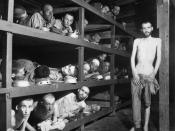One of the saddest aspects of the Holocaust was not how many lives were lost, but how many souls were lost. Those lucky enough to survive Auschwitz, Buchenwald, and the like came out changed men and women, and not for the better. While some, such as Elie Wiesel, were able to contribute to the world and keep alive the memory of the victims of the Holocaust, many left the experience shells; shadows of their former selves. So much had changed during their time in the concentration camps and they had lost so much of their dignity and identity.
This issue is a major aspect of the novel Night. The characters in Night are subjected to ghastly horrors at the concentration camps in which they are imprisoned. As a result, they start to lose their hope, dignity, and identity. The experience is thoroughly dehumanizing.
A wise person named Michael Moore once said, "The unfortunate thing about us humans is that once abused, some of us seek to abuse others...Sometimes
people just go crazy from too much abuse and violence and take drastic, irrational measures to protect themselves." In Night, this quote rings sadly true. With all the other atrocities they face, the concentration camp's prisoners shouldn't have to deal with their comrades turning on each other. Examples of this include the foreman who forces Elie to give him his gold tooth (53) and the old man whose son kills him for a piece of bread (96). In the first case, a young man named Franek, the foreman of the place where Elie works, one day suddenly tells Elie, "Give me your crown, kid." This is a shock; Elie describes him as a usually "sympathetic, intelligent youth" (52). Like so many others in the camp, though, Franek is not...


